European Union Prize for Literature
European Union Prize for Literature (established in 2009) is a European Union literary award. The award is funded and founded by the Culture Programme of the European Union, and is coordinated by a Consortium, selected by a Commission.[1] The Consortium is composed of the European Booksellers Federation, the European Writers' Council and the Federation of European Publishers.[1] The Consortium sets up the national juries and organizes the awards.
| European Union Prize for Literature | |
|---|---|
| Country | |
| Presented by | EUPL Consortium: European and International Booksellers Federation (EIBF), European Writers' Council (EWC), Federation of European Publishers (FEP) |
| First awarded | 2009 |
| Website | www.euprizeliterature.eu |
Each year 11 or 12 countries are selected to be part of the award, national juries are selected for each country, and each country's jury then selects a winner.[1] After three years of rotation, all countries will have been included. Countries eligible for inclusion include:[1]
- The 28 Member States of the European Union (as of 2013)
- The 3 EEA countries: Norway, Iceland and Liechtenstein
- The candidate countries for accession to the EU: Albania, Turkey, Montenegro, the Republic of Macedonia, Serbia
- Potential candidate country for accession to the EU: Bosnia and Herzegovina
Each winner receives €5,000 and their books are given support for translation funding, as well as promotion.[1]
Winners
2009
Winners for 2009 were announced November 2009.[1]
 Austria: Paulus Hochgatterer, Die Suesse des Lebens
Austria: Paulus Hochgatterer, Die Suesse des Lebens Croatia: Mila Pavićević, Djevojčica od leda i druge bajke
Croatia: Mila Pavićević, Djevojčica od leda i druge bajke France: Emmanuelle Pagano, Les Adolescents troglodytes
France: Emmanuelle Pagano, Les Adolescents troglodytes Hungary: Szécsi Noémi, Kommunista Monte Cristo
Hungary: Szécsi Noémi, Kommunista Monte Cristo Ireland: Karen Gillece, Longshore Drift
Ireland: Karen Gillece, Longshore Drift Italy: Daniele Del Giudice, Orizzonte mobile
Italy: Daniele Del Giudice, Orizzonte mobile Lithuania: Laura Sintija Cerniauskaité, Kvėpavimas į marmurą
Lithuania: Laura Sintija Cerniauskaité, Kvėpavimas į marmurą Norway: Carl Frode Tiller, Innsirkling
Norway: Carl Frode Tiller, Innsirkling Poland: Jacek Dukaj, Lód
Poland: Jacek Dukaj, Lód Portugal: Dulce Maria Cardoso, Os Meus Sentimentos
Portugal: Dulce Maria Cardoso, Os Meus Sentimentos Slovakia: Pavol Rankov, Stalo sa prvého septembra (alebo inokedy)
Slovakia: Pavol Rankov, Stalo sa prvého septembra (alebo inokedy) Sweden: Helena Henschen, I skuggan av ett brott
Sweden: Helena Henschen, I skuggan av ett brott
2010
Winners for 2010 were announced 18 November 2010.[1][2]
.svg.png.webp) Belgium: Peter Terrin, De Bewaker (The Guard)
Belgium: Peter Terrin, De Bewaker (The Guard)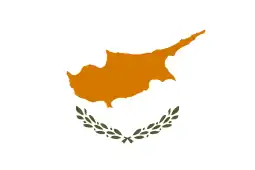 Cyprus: Myrto Azina Chronides, To Peirama
Cyprus: Myrto Azina Chronides, To Peirama Denmark: Adda Djørup, Den mindste modstand
Denmark: Adda Djørup, Den mindste modstand Estonia: Tiit Aleksejev, Palveränd
Estonia: Tiit Aleksejev, Palveränd Finland: Riku Korhonen, Lääkäriromaani
Finland: Riku Korhonen, Lääkäriromaani Germany: Iris Hanika, Das Eigentliche
Germany: Iris Hanika, Das Eigentliche Luxembourg: Jean Back, Amateur
Luxembourg: Jean Back, Amateur Romania: Răzvan Rădulescu, Teodosie cel Mic
Romania: Răzvan Rădulescu, Teodosie cel Mic Slovenia: Nataša Kramberger, Nebesa v robidah: roman v zgodbah
Slovenia: Nataša Kramberger, Nebesa v robidah: roman v zgodbah Spain: Raquel Martínez-Gómez, Sombras de unicornio
Spain: Raquel Martínez-Gómez, Sombras de unicornio Macedonia: Goce Smilevski, Сестрата на Зигмунд Фројд (Freud's Sister)
Macedonia: Goce Smilevski, Сестрата на Зигмунд Фројд (Freud's Sister)
2011
Winners for 2011 were announced 11 October 2011.[3][4]
 Bulgaria: Kalin Terziyski, Има ли кой да ви обича
Bulgaria: Kalin Terziyski, Има ли кой да ви обича Czech Republic: Tomáš Zmeškal, Milostný dopis klínovým písmem
Czech Republic: Tomáš Zmeškal, Milostný dopis klínovým písmem Greece: Kostas Hatziantoniou, Agrigento
Greece: Kostas Hatziantoniou, Agrigento Iceland: Ófeigur Sigurðsson, Jon
Iceland: Ófeigur Sigurðsson, Jon Latvia: Inga Zolude, Mierinājums Ādama kokam
Latvia: Inga Zolude, Mierinājums Ādama kokam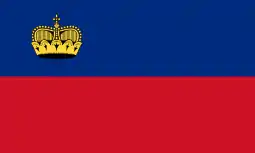 Liechtenstein: Iren Nigg, Man wortet sich die Orte selbst
Liechtenstein: Iren Nigg, Man wortet sich die Orte selbst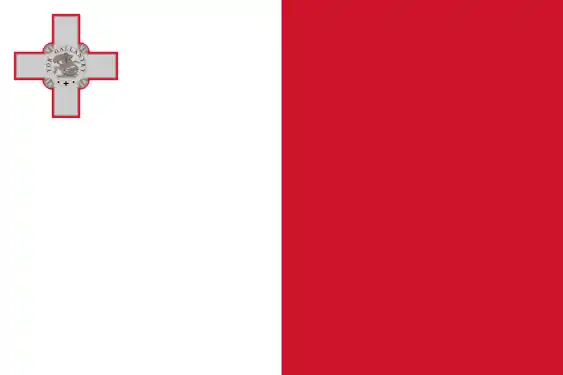 Malta: Immanuel Mifsud, Fl-Isem tal-Missier (tal-iben)
Malta: Immanuel Mifsud, Fl-Isem tal-Missier (tal-iben)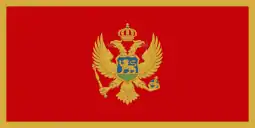 Montenegro: Andrej Nikolaidis, Sin
Montenegro: Andrej Nikolaidis, Sin The Netherlands: Rodaan Al Galidi, De autist en de postduif (The One with Autism and the Carrier Pidgeon)
The Netherlands: Rodaan Al Galidi, De autist en de postduif (The One with Autism and the Carrier Pidgeon) Serbia: Jelena Lengold, Vašarski Mađioničar
Serbia: Jelena Lengold, Vašarski Mađioničar Turkey: Çiler İlhan, Sürgün
Turkey: Çiler İlhan, Sürgün United Kingdom: Adam Foulds, The Quickening Maze
United Kingdom: Adam Foulds, The Quickening Maze
2012
The awards ceremony was in Brussels on 22 October 2012.[5]
 Austria: Anna Kim, Die gefrorene Zeit
Austria: Anna Kim, Die gefrorene Zeit Croatia: Lada Žigo, Rulet
Croatia: Lada Žigo, Rulet France: Laurence Plazenet, L’amour Seul
France: Laurence Plazenet, L’amour Seul Hungary: Viktor Horváth, Török Tükör
Hungary: Viktor Horváth, Török Tükör Ireland: Kevin Barry, City of Bohane
Ireland: Kevin Barry, City of Bohane Italy: Emanuele Trevi, Qualcosa di Scritto
Italy: Emanuele Trevi, Qualcosa di Scritto Lithuania: Giedra Radvilavičiūtė, Šiąnakt aš miegosiu prie sienos
Lithuania: Giedra Radvilavičiūtė, Šiąnakt aš miegosiu prie sienos Norway: Gunstein Bakke, Maud og Aud: Ein Roman om Trafikk
Norway: Gunstein Bakke, Maud og Aud: Ein Roman om Trafikk Poland: Piotr Paziński, Pensjonat
Poland: Piotr Paziński, Pensjonat Portugal: Afonso Cruz, A Boneca de Kokoschka
Portugal: Afonso Cruz, A Boneca de Kokoschka Slovakia: Jana Beňová, Cafe Hyena: Plán odprevádzania
Slovakia: Jana Beňová, Cafe Hyena: Plán odprevádzania Sweden: Sara Mannheimer, Handlingen
Sweden: Sara Mannheimer, Handlingen
2013
The winners were announced on 26 September 2013. The ceremony was in Brussels on 26 November 2013.[6][7]
.svg.png.webp) Belgium: Isabelle Wéry, Marilyn Désossée
Belgium: Isabelle Wéry, Marilyn Désossée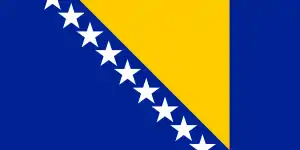 Bosnia and Herzegovina: Faruk Šehić, Knjiga o Uni
Bosnia and Herzegovina: Faruk Šehić, Knjiga o Uni Cyprus: Emilios Solomou, Hμερολóγιο μιας απιστίας
Cyprus: Emilios Solomou, Hμερολóγιο μιας απιστίας Denmark: Kristian Bang Foss, Døden kører audi
Denmark: Kristian Bang Foss, Døden kører audi Estonia: Meelis Friedenthal, Mesilased
Estonia: Meelis Friedenthal, Mesilased Finland: Katri Lipson, Jäätelökauppias
Finland: Katri Lipson, Jäätelökauppias Germany: Marica Bodrožić, Kirschholz und alte Gefühle
Germany: Marica Bodrožić, Kirschholz und alte Gefühle Luxembourg: Tullio Forgiarini, Amok – Eng Lëtzebuerger Liebeschronik
Luxembourg: Tullio Forgiarini, Amok – Eng Lëtzebuerger Liebeschronik Republic of Macedonia: Lidija Dimkovska, РЕЗЕРВЕН ЖИВОТ
Republic of Macedonia: Lidija Dimkovska, РЕЗЕРВЕН ЖИВОТ Romania: Ioana Pârvulescu, Viaţa începe vineri
Romania: Ioana Pârvulescu, Viaţa începe vineri Slovenia: Gabriela Babnik, Sušna doba
Slovenia: Gabriela Babnik, Sušna doba Spain: Cristian Crusat, Breve teoría del viaje y el desierto
Spain: Cristian Crusat, Breve teoría del viaje y el desierto
2014
The winners were announced on 8 October 2014 at the Frankfurt Book Fair.[8]
 Albania: Ben Blushi, Otello, Arapi i Vlorës (Othello, Arap of Vlora). Mapo Editions, 2011
Albania: Ben Blushi, Otello, Arapi i Vlorës (Othello, Arap of Vlora). Mapo Editions, 2011 Bulgaria: Milen Ruskov, Възвишение (Summit), Janet 45, 2011
Bulgaria: Milen Ruskov, Възвишение (Summit), Janet 45, 2011 Czech Republic: Jan Němec, Dějiny světla (A History of Light). Host, 2013
Czech Republic: Jan Němec, Dějiny světla (A History of Light). Host, 2013 Greece: Makis Tsitas, Μάρτυς μου ο Θεός (God is my witness). Kichli, 2013
Greece: Makis Tsitas, Μάρτυς μου ο Θεός (God is my witness). Kichli, 2013 Iceland: Oddný Eir, Jarðnæði (Land of Love, Plan of Ruins). Bjartur, 2011
Iceland: Oddný Eir, Jarðnæði (Land of Love, Plan of Ruins). Bjartur, 2011 Latvia: Jānis Joņevs, Doom 94 (Jelgava 94). Mansards, 2013
Latvia: Jānis Joņevs, Doom 94 (Jelgava 94). Mansards, 2013 Liechtenstein: Armin Öhri, Die dunkle Muse: Historischer Kriminalroman (The Dark Muse). Gmeiner, 2012
Liechtenstein: Armin Öhri, Die dunkle Muse: Historischer Kriminalroman (The Dark Muse). Gmeiner, 2012 Malta: Pierre J. Mejlak, Dak li l-Lejl Iħallik Tgħid (What the Night Lets You Say). Merlin Publishers, 2011
Malta: Pierre J. Mejlak, Dak li l-Lejl Iħallik Tgħid (What the Night Lets You Say). Merlin Publishers, 2011 Montenegro: Ognjen Spahić, Puna glava radosti (Head Full of Joy). Nova knjiga, 2014
Montenegro: Ognjen Spahić, Puna glava radosti (Head Full of Joy). Nova knjiga, 2014 The Netherlands: Marente de Moor, De Nederlandse maagd (The Dutch Maiden). Querido, 2010
The Netherlands: Marente de Moor, De Nederlandse maagd (The Dutch Maiden). Querido, 2010 Serbia: Uglješa Šajtinac, Sasvim skromni darovi (Quite Modest Gifts). Arhipelag, 2011
Serbia: Uglješa Šajtinac, Sasvim skromni darovi (Quite Modest Gifts). Arhipelag, 2011 Turkey: Birgül Oğuz, Hah (Aha), short stories. Metis, 2012
Turkey: Birgül Oğuz, Hah (Aha), short stories. Metis, 2012 United Kingdom: Evie Wyld, All The Birds, Singing. Vintage, 2013
United Kingdom: Evie Wyld, All The Birds, Singing. Vintage, 2013
2015
The winners were announced in April 2015, at the opening ceremony of the London Book Fair by Tibor Navracsics, European Commissioner for Education, Culture, Youth and Sport.[9]
 Austria: Carolina Schutti, Einmal muss ich über weiches Gras gelaufen sein (Once I must have trodden soft grass). Otto Müller Verlag, 2012
Austria: Carolina Schutti, Einmal muss ich über weiches Gras gelaufen sein (Once I must have trodden soft grass). Otto Müller Verlag, 2012 Croatia: Luka Bekavac, Viljevo. Fraktura, 2013
Croatia: Luka Bekavac, Viljevo. Fraktura, 2013 France: Gaëlle Josse, Le dernier gardien d’Ellis Island (The last guardian of Ellis Island). Editions Noir sur Blanc, 2014
France: Gaëlle Josse, Le dernier gardien d’Ellis Island (The last guardian of Ellis Island). Editions Noir sur Blanc, 2014 Hungary: Edina Szvoren, Nincs, és ne is legyen (There Is None, Nor Let There Be). Palatinus, 2012
Hungary: Edina Szvoren, Nincs, és ne is legyen (There Is None, Nor Let There Be). Palatinus, 2012 Ireland: Donal Ryan, The Spinning Heart. Doubleday Ireland, 2013
Ireland: Donal Ryan, The Spinning Heart. Doubleday Ireland, 2013 Italy: Lorenzo Amurri, Apnea. Fandango Libri, 2013
Italy: Lorenzo Amurri, Apnea. Fandango Libri, 2013 Lithuania: Undinė Radzevičiūtė, Žuvys ir drakonai (Fishes and Dragons). Baltos lankos, 2013
Lithuania: Undinė Radzevičiūtė, Žuvys ir drakonai (Fishes and Dragons). Baltos lankos, 2013 Norway: Ida Hegazi Høyer, Unnskyld (Forgive me). Tiden Norsk Forlag, 2014
Norway: Ida Hegazi Høyer, Unnskyld (Forgive me). Tiden Norsk Forlag, 2014 Poland: Magdalena Parys, Magik (Magician). Świat Książki, 2014
Poland: Magdalena Parys, Magik (Magician). Świat Książki, 2014 Portugal: David Machado, Índice Médio de Felicidade (Average Happiness Index). Dom Quixote, 2013
Portugal: David Machado, Índice Médio de Felicidade (Average Happiness Index). Dom Quixote, 2013 Slovakia: Svetlana Zuchova, Obrazy zo života M. (Scenes from the Life of M.). Marenčin PT, 2013
Slovakia: Svetlana Zuchova, Obrazy zo života M. (Scenes from the Life of M.). Marenčin PT, 2013 Sweden: Sara Stridsberg, Beckomberga - ode till min familj (The Gravity of Love). Albert Bonniers Förlag, 2014
Sweden: Sara Stridsberg, Beckomberga - ode till min familj (The Gravity of Love). Albert Bonniers Förlag, 2014
2016
The winners were announced in April 2016 at the European Commission.[10]
.svg.png.webp) Belgium: Christophe Van Gerrewey, Op de Hoogte (Up to date)
Belgium: Christophe Van Gerrewey, Op de Hoogte (Up to date) Bosnia and Herzegovina: Tanja Stupar-Trifunović, Satovi u majčinoj sobi (Clocks in my mother's room)
Bosnia and Herzegovina: Tanja Stupar-Trifunović, Satovi u majčinoj sobi (Clocks in my mother's room) Cyprus: Antonis Georgiou, Ένα Άλπουμ Ιστορίες (An Album of Stories)
Cyprus: Antonis Georgiou, Ένα Άλπουμ Ιστορίες (An Album of Stories) Denmark: Bjørn Rasmussen, Huden er det elastiske hylster der omgiver hele legemet
Denmark: Bjørn Rasmussen, Huden er det elastiske hylster der omgiver hele legemet Estonia: Paavo Matsin, Gogoli disko (The Gogol Disco)
Estonia: Paavo Matsin, Gogoli disko (The Gogol Disco) Finland: Selja Ahava, Taivaalta tippuvat asiat (Things that fall from the Sky)
Finland: Selja Ahava, Taivaalta tippuvat asiat (Things that fall from the Sky) Germany: Benedict Wells, Vom Ende der Einsamkeit (On the End of Loneliness)
Germany: Benedict Wells, Vom Ende der Einsamkeit (On the End of Loneliness) Luxembourg: Gast Groeber, All Dag verstoppt en aneren (One Day Hides Another)
Luxembourg: Gast Groeber, All Dag verstoppt en aneren (One Day Hides Another) Romania: Claudiu M. Florian, Vârstele jocului. Strada Cetăţii. (The Ages of the Game – Citadel Street)
Romania: Claudiu M. Florian, Vârstele jocului. Strada Cetăţii. (The Ages of the Game – Citadel Street) Slovenia: Jasmin B. Frelih, Na/pol (In/Half)
Slovenia: Jasmin B. Frelih, Na/pol (In/Half) Spain: Jesús Carrasco, La tierra que pisamos (The Earth We Tread)
Spain: Jesús Carrasco, La tierra que pisamos (The Earth We Tread) Republic of Macedonia: Nenad Joldeski, Секој со своето езеро (Each with their own lake)
Republic of Macedonia: Nenad Joldeski, Секој со своето езеро (Each with their own lake)
2017
The winners were announced 21 April 2017.[11]
 Albania: Rudi Erebara, Epika e yjeve të mëngjesit (The Epic of the Morning Stars), 2016 [12]
Albania: Rudi Erebara, Epika e yjeve të mëngjesit (The Epic of the Morning Stars), 2016 [12] Bulgaria: Ina Vultchanova, Остров Крах (The Crack-Up Island), 2016 [13]
Bulgaria: Ina Vultchanova, Остров Крах (The Crack-Up Island), 2016 [13] Czech Republic: Bianca Bellová, Jezero (The Lake), 2016 [14]
Czech Republic: Bianca Bellová, Jezero (The Lake), 2016 [14] Greece: Kallia Papadaki, Δενδρίτες (Dendrites), 2015 [15]
Greece: Kallia Papadaki, Δενδρίτες (Dendrites), 2015 [15] Iceland: Halldóra K. Thoroddsen, Tvöfalt gler (Double Glazing), 2016 [16]
Iceland: Halldóra K. Thoroddsen, Tvöfalt gler (Double Glazing), 2016 [16] Latvia: Osvalds Zebris, Gaiļu kalna ēnā (In the Shadow of Rooster Hill), 2014 [17][18]
Latvia: Osvalds Zebris, Gaiļu kalna ēnā (In the Shadow of Rooster Hill), 2014 [17][18] Malta: Walid Nabhan, L-Eżodu taċ-Ċikonji (Exodus of Storks), 2013[19]
Malta: Walid Nabhan, L-Eżodu taċ-Ċikonji (Exodus of Storks), 2013[19] Montenegro: Aleksandar Bečanović, Arcueil (Arcueil), 2015 [20]
Montenegro: Aleksandar Bečanović, Arcueil (Arcueil), 2015 [20] Netherlands: Jamal Ouariachi, Een Honger (A hunger), 2015 [21]
Netherlands: Jamal Ouariachi, Een Honger (A hunger), 2015 [21] Serbia: Darko Tuševljaković, Jaz (The Chasm), 2016 [22]
Serbia: Darko Tuševljaković, Jaz (The Chasm), 2016 [22] Turkey: Sine Ergün, Baştankara (Chickadee), 2016 [23]
Turkey: Sine Ergün, Baştankara (Chickadee), 2016 [23] United Kingdom: Sunjeev Sahota, The Year of the Runaways, 2015 [24]
United Kingdom: Sunjeev Sahota, The Year of the Runaways, 2015 [24]
2019
The winners were announced 24 May 2019.[25]
 Austria: Laura Freudenthaler, Geistergeschichte (A ghost story)
Austria: Laura Freudenthaler, Geistergeschichte (A ghost story) Finland: Piia Leino, Taivas (Heaven)
Finland: Piia Leino, Taivas (Heaven) France: Sophie Daull, Au grand lavoir (The Wash-house)
France: Sophie Daull, Au grand lavoir (The Wash-house) Hungary: Réka Mán-Várhegyi, Mágneshegy (Magnetic Hill)
Hungary: Réka Mán-Várhegyi, Mágneshegy (Magnetic Hill) Georgia: Beqa Adamashvili, პროლოგი (Everybody dies in this novel)
Georgia: Beqa Adamashvili, პროლოგი (Everybody dies in this novel) Greece: Nikos Chryssos, Καινούργια μέρα (New Day)
Greece: Nikos Chryssos, Καινούργια μέρα (New Day) Ireland: Jan Carson, The Firestarters
Ireland: Jan Carson, The Firestarters Italy: Giovanni Dozzini, E Baboucar guidava la fila (And Baboucar was leading the line)
Italy: Giovanni Dozzini, E Baboucar guidava la fila (And Baboucar was leading the line) Lithuania: Daina Opolskaite, DIENŲ PIRAMIDĖS (The Hour of Dusk)
Lithuania: Daina Opolskaite, DIENŲ PIRAMIDĖS (The Hour of Dusk) Poland: Marta Dzido, Frajda (Pleasure)
Poland: Marta Dzido, Frajda (Pleasure) Romania: Tatiana Țîbuleac, Grădina de sticlă (The Glass Garden)
Romania: Tatiana Țîbuleac, Grădina de sticlă (The Glass Garden) Slovakia: Ivana Dobrakovová, Matky a kamionisti (Mothers and Lorry Drivers)
Slovakia: Ivana Dobrakovová, Matky a kamionisti (Mothers and Lorry Drivers) Ukraine: Halya Shyyan, ЗА СПИНОЮ (Behind the back)
Ukraine: Halya Shyyan, ЗА СПИНОЮ (Behind the back) United Kingdom: Melissa Harrison, All Among the Barley
United Kingdom: Melissa Harrison, All Among the Barley
2020
The winners were announced 19 May 2020.[26]
.svg.png.webp) Belgium: Nathalie Skowronek, La carte des regrets (The map of regrets)
Belgium: Nathalie Skowronek, La carte des regrets (The map of regrets) Bosnia and Herzegovina: Lana Bastašić, Uhvati zeca (Catch the rabbit)
Bosnia and Herzegovina: Lana Bastašić, Uhvati zeca (Catch the rabbit) Croatia: Maša Kolanović, Poštovani kukci i druge jezive priče (Dear insects and other scary stories)
Croatia: Maša Kolanović, Poštovani kukci i druge jezive priče (Dear insects and other scary stories) Cyprus: Σταύρος Χριστοδούλου (Stavros Christodoulou), Τη μέρα που πάγωσε ο ποταμός (The day the river froze)
Cyprus: Σταύρος Χριστοδούλου (Stavros Christodoulou), Τη μέρα που πάγωσε ο ποταμός (The day the river froze) Denmark: Asta Olivia Nordenhof, 'Penge på lommen' (Money in your pocket)
Denmark: Asta Olivia Nordenhof, 'Penge på lommen' (Money in your pocket) Estonia: Mudlum (Made Luiga), Poola poisid (Polish boys)
Estonia: Mudlum (Made Luiga), Poola poisid (Polish boys) Germany: Matthias Nawrat, Der traurige Gast (The Sad Guest)
Germany: Matthias Nawrat, Der traurige Gast (The Sad Guest)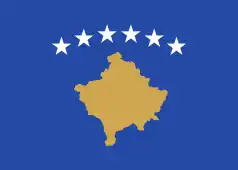 Kosovo: Shpëtim Selmani, Libërthi i dashurisë (The Booklet of Love)
Kosovo: Shpëtim Selmani, Libërthi i dashurisë (The Booklet of Love) Luxembourg: Francis Kirps, Die Mutationen (The Mutations)
Luxembourg: Francis Kirps, Die Mutationen (The Mutations) Montenegro: Stefan Bošković, Ministar (Minister)
Montenegro: Stefan Bošković, Ministar (Minister) North Macedonia: Петар Андоновски (Petar Andonovski), Страв од варвари (Fear of barbarians)
North Macedonia: Петар Андоновски (Petar Andonovski), Страв од варвари (Fear of barbarians) Norway: Maria Navarro Skaranger, Bok om sorg (Book of grief)
Norway: Maria Navarro Skaranger, Bok om sorg (Book of grief) Spain: Irene Solà, Canto jo i la muntanya balla (I sing and the mountain dances)
Spain: Irene Solà, Canto jo i la muntanya balla (I sing and the mountain dances)
Translations
The European Union promotes the transnational circulation of literature and its diversity in Europe and beyond.[27] The list below shows some translations available in English language:
 Selja Ahava, Things that fall from the sky, Oneworld Publications, 2015
Selja Ahava, Things that fall from the sky, Oneworld Publications, 2015 Gabriela Babnik, Dry Season, Istros Books, 2012
Gabriela Babnik, Dry Season, Istros Books, 2012 Bosnia and Herzegovina Lana Bastašić, Catch the Rabbit, Picador, 2021
Bosnia and Herzegovina Lana Bastašić, Catch the Rabbit, Picador, 2021 Jana Beňová, Seeing People Off, Two Dollar Radio, 2017
Jana Beňová, Seeing People Off, Two Dollar Radio, 2017 Dulce Maria Cardoso, Violeta Among the Stars, MacLehose Press, 2020
Dulce Maria Cardoso, Violeta Among the Stars, MacLehose Press, 2020 Laura Sintija Cerniauskaité, Breathing into Marble, Noir Press, 2017
Laura Sintija Cerniauskaité, Breathing into Marble, Noir Press, 2017 Myrto Azina Chronides, The Experiment, Garnet Pub Ltd, 2012
Myrto Azina Chronides, The Experiment, Garnet Pub Ltd, 2012 Cristian Crusat, A Brief Theory of Travel and the Desert, Hispabooks Pub, 2016
Cristian Crusat, A Brief Theory of Travel and the Desert, Hispabooks Pub, 2016 Afonso Cruz, Kokoschka's Doll, MacLehose Press, 2020
Afonso Cruz, Kokoschka's Doll, MacLehose Press, 2020 Lidija Dimkovska, A Spare Life, Two Lines Press, 2016
Lidija Dimkovska, A Spare Life, Two Lines Press, 2016 Oddný Eir, Land of Love and Ruins, Restless Books, 2016
Oddný Eir, Land of Love and Ruins, Restless Books, 2016 Jasmin B. Frelih, In/Half, Oneworld Pubns, 2018
Jasmin B. Frelih, In/Half, Oneworld Pubns, 2018 Paulus Hochgatterer, The Sweetness of Life, MacLehose Press, 2006
Paulus Hochgatterer, The Sweetness of Life, MacLehose Press, 2006 Çiler İlhan, Exile, Istros Books, 2015
Çiler İlhan, Exile, Istros Books, 2015 Jānis Joņevs, Doom 94, Wrecking Ball Press, 2018
Jānis Joņevs, Doom 94, Wrecking Ball Press, 2018 Gaëlle Josse, The Last Days of Ellis Island, World Edtns Llc, 2020
Gaëlle Josse, The Last Days of Ellis Island, World Edtns Llc, 2020 Anna Kim, Frozen Time, Ariadne Press, 2008
Anna Kim, Frozen Time, Ariadne Press, 2008 Jelena Lengold, Fairground Magician, Istros Books, 2013
Jelena Lengold, Fairground Magician, Istros Books, 2013 Katri Lipson, The Ice Cream Man, Amazon Crossing, 2012
Katri Lipson, The Ice Cream Man, Amazon Crossing, 2012 David Machado, The Shelf Life of Happiness, Amazon Crossing, 2016
David Machado, The Shelf Life of Happiness, Amazon Crossing, 2016 Paavo Matsin, The Gogol Disco, Dalkey Archive Press, 2020
Paavo Matsin, The Gogol Disco, Dalkey Archive Press, 2020 Immanuel Mifsud, In the Name of the Father (and of the Son), Parthian Books, 2019
Immanuel Mifsud, In the Name of the Father (and of the Son), Parthian Books, 2019 Marente de Moor, The dutch Maiden, World Editions International, 2016
Marente de Moor, The dutch Maiden, World Editions International, 2016 Andrej Nikolaidis, The Son, Istros Books, 2013
Andrej Nikolaidis, The Son, Istros Books, 2013 Birgül Oğuz, Hah, World Editions International, 2016
Birgül Oğuz, Hah, World Editions International, 2016 Emmanuelle Pagano, One Day I’ll Tell You Everything, Text Publishing, 2020
Emmanuelle Pagano, One Day I’ll Tell You Everything, Text Publishing, 2020 Ioana Pârvulescu, Life Begins on Friday, Istros Books, 2016
Ioana Pârvulescu, Life Begins on Friday, Istros Books, 2016 Piotr Paziński, The Boarding House, Dalkey Archive, 2018
Piotr Paziński, The Boarding House, Dalkey Archive, 2018 Faruk Šehić, Quiet Flows the Una, Istros Books, 2016
Faruk Šehić, Quiet Flows the Una, Istros Books, 2016 Goce Smilevski, Freud's Sister, Penguin Books, 2012
Goce Smilevski, Freud's Sister, Penguin Books, 2012 Ognjen Spahić, A Head Full of Joy, Dalkey Archive Press, 2018
Ognjen Spahić, A Head Full of Joy, Dalkey Archive Press, 2018.svg.png.webp) Peter Terrin, The Guard, MacLehose Press, 2012
Peter Terrin, The Guard, MacLehose Press, 2012 Carl Frode Tiller, Encircling, Graywolf Press, 2017
Carl Frode Tiller, Encircling, Graywolf Press, 2017 Emanuele Trevi, Something written, World Editions International, 2016
Emanuele Trevi, Something written, World Editions International, 2016 Makis Tsitas, God Is My Witness, Aiora Books, 2019
Makis Tsitas, God Is My Witness, Aiora Books, 2019 Benedict Wells, The End of Loneliness, Sceptre, 2018
Benedict Wells, The End of Loneliness, Sceptre, 2018 Tomáš Zmeškal, Love Letter in Cuneiform, Yale University Press, 2008
Tomáš Zmeškal, Love Letter in Cuneiform, Yale University Press, 2008
References
- European Union Prize for Literature, official website
- "Winners of 2010 EU Prize for Literature honoured at award ceremony." European Union News 22 Nov. 2010. Infotrac Newsstand. Retrieved 11 Oct. 2012.
- "Winners of the 2011 European Union Prize for Literature". Euprizeliterature.eu. 11 October 2011. Archived from the original on 1 March 2014. Retrieved 23 July 2013.
- "Winners of the 2011 European Union Prize for literature." European Union News 11 Oct. 2011. General OneFile. Retrieved 11 Oct. 2012.
- "EU Prize for Literature picks 12-to-read". Euronews. 9 October 2012. Archived from the original on 14 October 2012. Retrieved 10 October 2012.
- Elana Ralli (26 September 2013). "Announcing the winners of the 2013 European Union Prize for Literature". New Europe. Archived from the original on 28 March 2016. Retrieved 27 September 2013.
- Staff writer (26 September 2013). "Winners of 2013 European Union Prize for Literature announced at Göteborg Book Fair". EU Reporter Magazine. Retrieved 27 September 2013.
- European Commission. "Winners of 2014 European Union Prize for Literature announced at Frankfurt Book Fair - Press Release". Retrieved 11 October 2014.
- "European Union Prize for Literature 2015 winners announced at London Book Fair". European Commission. April 2015. Retrieved 20 April 2015.
- "2016 EU Prize for Literature winners announced". ec.europa.eu. Retrieved 25 March 2017.
- "Announcement of winners of the 2017 European Union Prize for Literature". ec.europa.eu. 21 April 2017. Archived from the original on 23 April 2017. Retrieved 22 April 2017.
- "Winning Authors 2017: Rudi Erebara". ec.europa.eu. 21 April 2017. Archived from the original on 23 April 2017. Retrieved 22 April 2017.
- "Winning Authors 2017: Ina Vultchanova". ec.europa.eu. 21 April 2017. Archived from the original on 23 April 2017. Retrieved 22 April 2017.
- "Winning Authors 2017: Bianca Bellová". ec.europa.eu. 21 April 2017. Archived from the original on 23 April 2017. Retrieved 22 April 2017.
- "Winning Authors 2017: Kallia Papadaki". ec.europa.eu. 21 April 2017. Archived from the original on 23 April 2017. Retrieved 22 April 2017.
- "Winning Authors 2017: Halldóra K. Thoroddsen". ec.europa.eu. 21 April 2017. Archived from the original on 23 April 2017. Retrieved 22 April 2017.
- "Winning Authors 2017: Osvalds Zebris". ec.europa.eu. 21 April 2017. Archived from the original on 23 April 2017. Retrieved 22 April 2017.
- "Writer wins EU Prize for Literature". eng.lsm.lv. 21 April 2016. Retrieved 25 April 2017.
- "Winning Authors 2017: Walid Nabhan". ec.europa.eu. 21 April 2017. Archived from the original on 23 April 2017. Retrieved 22 April 2017.
- "Winning Authors 2017: Aleksandar Bečanović". ec.europa.eu. 21 April 2017. Archived from the original on 23 April 2017. Retrieved 22 April 2017.
- "Winning Authors 2017: Jamal Ouariachi". ec.europa.eu. 21 April 2017. Archived from the original on 23 April 2017. Retrieved 22 April 2017.
- "Winning Authors 2017: Darko Tuševljaković". ec.europa.eu. 21 April 2017. Archived from the original on 23 April 2017. Retrieved 22 April 2017.
- "Winning Authors 2017: Sine Ergün". ec.europa.eu. 21 April 2017. Archived from the original on 23 April 2017. Retrieved 22 April 2017.
- "Winning Authors 2017: Sunjeev Sahota". ec.europa.eu. 21 April 2017. Archived from the original on 23 April 2017. Retrieved 22 April 2017.
- "Winners of the 2019 EU Prize for Literature announced". PenNews. Retrieved 27 May 2019.
- "European Union Prize For Literature announces 2020 laureates". Retrieved 19 May 2020.
- "Creative Europe | EU Prize for Literature". www.euprizeliterature.eu.
External links
- European Union Prize for Literature official website